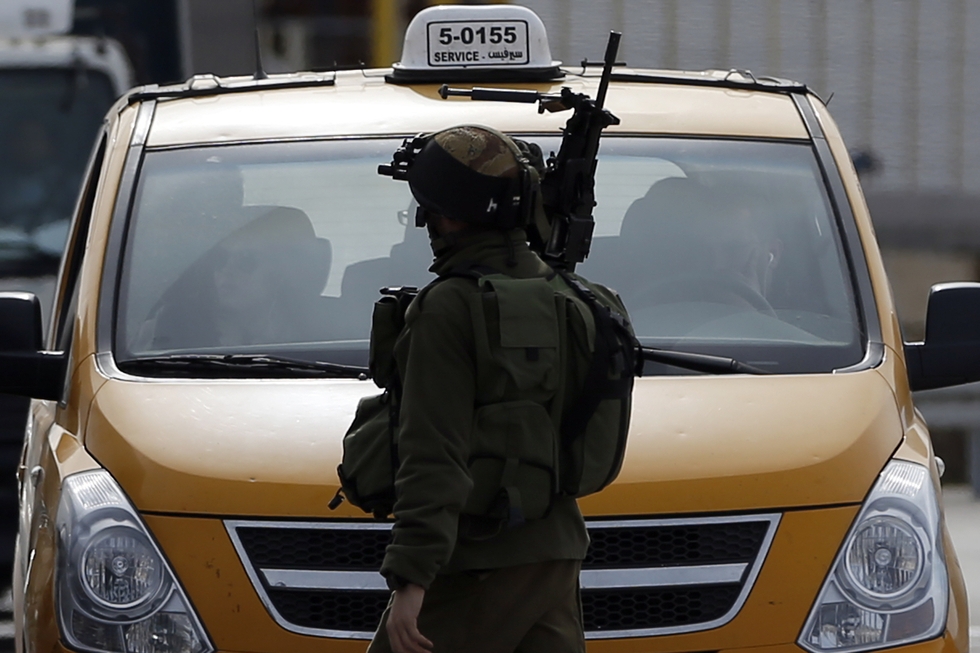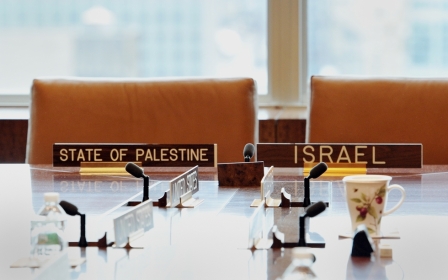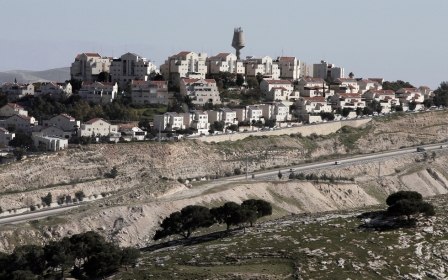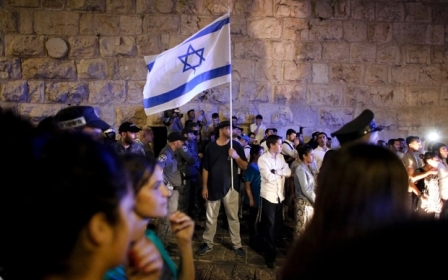The parallel policies that won't bring peace to historic Palestine

Once again another initiative to bring peace to historic Palestine is in the making. The last one by US Secretary of State John Kerry in 2013-14 ended in tatters and was soon followed with a devastating war on Gaza by the Israeli military. The US declared in 2015 that it was taking a back seat for the remainder of President Obama’s term.
This time it is the French. Foreign Minister Laurent Fabius announced that his country is leading an initiative to convene an international peace conference to renew the dormant peace process. He told French diplomats "unfortunately Israeli settlement construction continues. We must not let the two-state solution unravel. It is our responsibility as a permanent member of the UN Security Council."
He elaborated that should this initiative fail, France will recognise Palestine as a state. Palestinian Authority President Mahmoud Abbas, who has been calling for such a conference in recent weeks, was quick to welcome this initiative. However, true to form, Israeli Prime Minister Benjamin Netanyahu through a spokesman rejected the French "ultimatum as it would only encourage the Palestinians not to negotiate". In reality, this is in line with his promise during the 2015 Israeli general elections that a Palestinian state would not be created on his watch.
This also comes at the very moment when Israel was flexing its muscles to once again remind the Palestinians that Israel controls every aspect of their lives and will punish them collectively if and when it judges this to be desirable. It placed an effective siege on Ramallah following an attack on occupation soldiers by a member of the PA's security forces at the (VIP) DCO checkpoint from Ramallah into Jerusalem.
Israel's policy towards the Palestinians
Israel's policy towards the Palestinians can be summarised as using both disproportionate brutal force and "the law" to suppress any resistance to its illegal occupation and as a means of encouraging the Palestinians to leave. It uses many instruments to achieve this. One of these is house demolitions for those it accuses of either committing "terrorist acts" or building without a permit.
The most recent example of this was the demolition of 23 homes in the "firing zone area 918" in the West Bank. This made 100 people homeless.
Both methods are applied particularly harshly to the Palestinians in Jerusalem. Families whose relatives are killed by Israel immediately after attacks on Israelis or subsequently, suffer the double pain of losing their loved ones and then their homes. Further pain is achieved by withholding the bodies of those lost relatives for long periods and when they are eventually released, imposing what the families see as humiliating conditions on their funerals to avoid "celebrations" of their attacks and "martyrdom".
Another is the use of administrative detention. Israel can simply hold anyone indefinitely using this instrument. A request to military courts for renewal of the six monthly stints is almost always approved. The detainee and his/her lawyers are not privy to the reasons for the detention. Palestinians detained under this law have resorted to hunger strikes that have lasted for weeks and even months. The most recent was journalist Mohammed Al-Qiq whose detention order was suspended on 4 February, 2016 due to his poor health after 72 days on hunger strike. His response was to reject the suspension and to continue his hunger strike.
Israel has also used forced exile either of Palestinians from Jerusalem to the West Bank or from the West Bank to Gaza. Following the Church of the Nativity siege in 2002, a number of the captives were exiled to Gaza or countries outside Palestine for fixed periods, but Israel has reneged on the terms of this exile in a number of cases.
The Palestinians Israel has treated most brutally are undoubtedly those under siege in Gaza. Not only has it placed 1.8 million people under a permanent siege which has deprived them of any semblance of a dignified or normal life, it has launched repeated attacks since its troops redeployed to the edge of the enclave which have heaped death, injury and destruction on the beleaguered people and infrastructure.
When Palestinians exercise their right to resist they are accused of terrorism, including bizarrely "political terror" for joining the International Criminal Court and seeking to bring Israeli leaders to justice for suspected war crimes.
The instruments that constitute Israeli policy, which have been applied for decades, have failed to either force the Palestinians out of their homeland or to submit to the occupier. It seems Israel thinks next time it can just invent more brutal instruments to achieve its aims, but it will surely fail.
Mild game of cat and mouse
The international community has for decades pursued a mild cat and mouse game with Israel. It makes grand statements about the illegality of Israeli policies, particularly settlement construction, thus appearing to be a "critical friend," but leaves its teeth back at base. The reason given to explain the contradiction between recognising that Israel carries out illegal acts and not acting on this revolves around the fear that any criticism would "damage prospects for peace". The same stance extends to simply recognising Palestinian rights.
While key members of the international community recognised Israel before it recognised Palestine, they argue that recognition of Palestine should only come after a peace deal is struck. Israel agrees because it claims the Palestinians will not negotiate in the future. However, it knows full well that recognition on its own - as exemplified by that from Sweden - changes little on the ground.
When the EU, a member of the Middle East Quartet and key player in the peace process, dared to enact a policy of labelling some products from the illegal settlements, they had to explain that this was certainly not a sanction or a boycott.
A quick search using any reputable internet search engine reveals that the most favoured terms to express displeasure about Israel’s settlement drive yields "condemn"; "express concern"; "express deep concern"; "find it unhelpful"; "reduces the chances for peace"; "reduces the viability of the two-state solution"; and I am sure there are others. It must exercise officials, particularly in the British Foreign Office and the US State Department, to find new meaningless phrases to express displeasure at a new settlement announcement, even when the US vice president is in Tel Aviv.
When the US Ambassador to Israel Dan Shapiro criticised it for applying “a legal double standard in the West bank,” he was vilified and his comments deemed “unacceptable" by Prime Minister Netanyahu. When the UN Secretary General Ban Ki-moon dared to call illegal Israeli settlement expansion “an affront to the world,” he was accused of giving a “tailwind to terror” by Netanyahu.
The international community’s policy over decades has only provided impunity for Israel to continue its colonisation of the occupied territories and oppression of the Palestinians and more recently for an escalation of settler violence.
Two misguided policies that failed
The dormant peace process and the escalating colonisation of Palestine show the impact the two parallel policies have had. If only one of these policies was practised it would not help bring about peace. However, the two together have neither led to an end to Palestinian resistance nor to Israel refraining from illegal actions, thus pushing any prospects for peace into the distant future.
Israel should realise that its brutal punishment of the Palestinians may have brought periods of calm, but has not brought its citizens permanent security and the signs are that this is not on the cards. Recognition of Palestinian rights is the only way to achieve peace and security.
On the other hand, the international community should realise that without teeth, its policy has failed to bring peace about but, more dangerously, has allowed Israeli society to be comfortable with an occupation that seems to exist in some other distant country.
- Kamel Hawwash is a British/Palestinian engineering professor based at the University of Birmingham and a long-standing campaigner for justice, especially for the Palestinian people. He is Vice Chair of the Palestine Solidarity Campaign (PSC) and appears regularly in the media as commentator on Middle East issues. He runs a blog at www.kamelhawwash.com. He writes here in a personal capacity.
The views expressed in this article belong to the author and do not necessarily reflect the editorial policy of Middle East Eye.
Photo: An Israeli soldier checks the vehicles of Palestinians on their way out of the occupied West Bank village of Ein Sinya, northern Ramallah on 1 February, 2016 (AFP).
Middle East Eye propose une couverture et une analyse indépendantes et incomparables du Moyen-Orient, de l’Afrique du Nord et d’autres régions du monde. Pour en savoir plus sur la reprise de ce contenu et les frais qui s’appliquent, veuillez remplir ce formulaire [en anglais]. Pour en savoir plus sur MEE, cliquez ici [en anglais].





